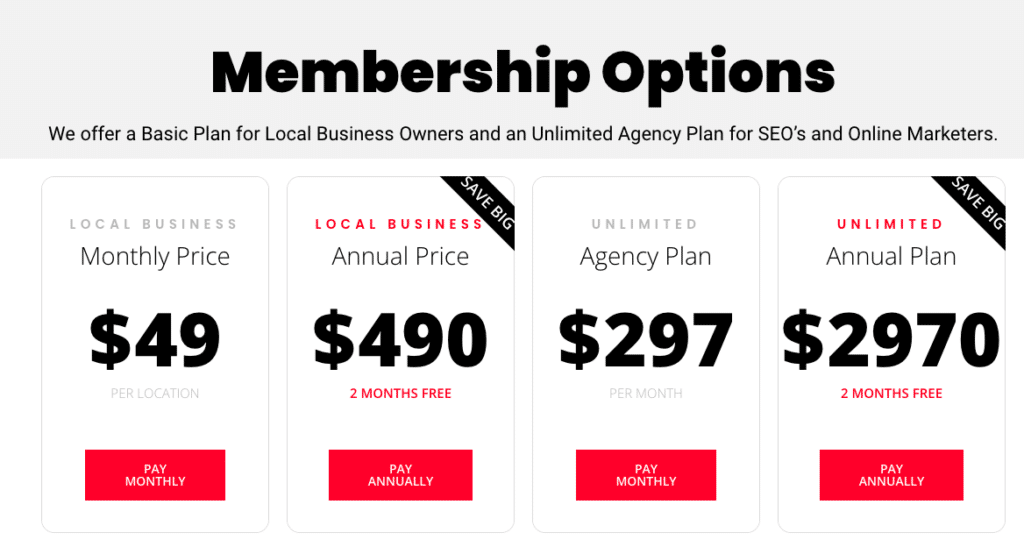Modern Tactics for Promoting Local Business Listings

Local business listings play a crucial role in the success of small businesses. With the rise of online search and mobile usage, it has become essential for local businesses to optimize their online presence and ensure their listings are easily discoverable by potential customers. In this article, we will explore modern tactics for promoting local business listings, backed by research, examples, and case studies.
Get your FREE 14 DAY TRIAL for over 300 local citations. Click below!

The Importance of Local Business Listings
Before diving into the tactics, let’s first understand why local business listings are so important. According to a study conducted by Google, 46% of all searches have local intent. This means that nearly half of all online searches are performed with the intention of finding local businesses or services. Furthermore, 76% of people who search for something nearby on their smartphones visit a related business within a day, and 28% of those searches result in a purchase.
These statistics clearly highlight the significance of local business listings in driving foot traffic and generating sales for small businesses. By optimizing their listings, businesses can increase their visibility, attract more customers, and ultimately grow their revenue.
Optimizing Local Business Listings
Now that we understand the importance of local business listings, let’s explore some modern tactics for optimizing them:
1. Claim and Verify Your Listings
The first step in optimizing your local business listings is to claim and verify them on popular search engines and directories such as Google My Business, Bing Places, and Yelp. This process involves providing accurate and up-to-date information about your business, including your address, phone number, website, and operating hours.
By claiming and verifying your listings, you gain control over the information displayed to potential customers. This ensures that your business details are accurate, consistent, and easily accessible, improving your chances of appearing in relevant search results.
2. Optimize Your Business Description
When optimizing your local business listings, pay close attention to your business description. This is an opportunity to showcase your unique selling points and entice potential customers to choose your business over competitors.
Use persuasive language and highlight the key benefits of your products or services. Incorporate relevant keywords that people are likely to search for when looking for businesses like yours. However, avoid keyword stuffing, as search engines may penalize your listing for spammy practices.
3. Encourage Customer Reviews
Customer reviews play a significant role in influencing purchasing decisions. According to a survey conducted by BrightLocal, 85% of consumers trust online reviews as much as personal recommendations. Therefore, it is crucial to encourage your satisfied customers to leave positive reviews on your local business listings.
One effective way to encourage reviews is by sending follow-up emails to customers after their purchase, thanking them for their business and kindly requesting a review. You can also incentivize reviews by offering discounts or rewards to customers who leave feedback.
4. Leverage Online Directories and Review Sites
In addition to popular search engines, there are numerous online directories and review sites that can significantly boost your local business listings. These platforms, such as TripAdvisor, Yellow Pages, and Angie’s List, have a large user base actively searching for local businesses.
Ensure that your business is listed on relevant directories and review sites in your industry. This not only increases your online visibility but also improves your credibility and reputation among potential customers.
5. Optimize for Voice Search
Voice search is rapidly gaining popularity, with 55% of households projected to own a smart speaker by 2022. To stay ahead of the curve, it is crucial to optimize your local business listings for voice search.
When optimizing for voice search, focus on long-tail keywords and conversational phrases that people are likely to use when speaking to voice assistants. For example, instead of targeting the keyword “Italian restaurant,” optimize for phrases like “Where can I find the best Italian restaurant near me?”
Case Studies and Examples
Let’s take a look at some real-life examples and case studies that demonstrate the effectiveness of these modern tactics:
Example 1: Citation Vault
Citation Vault is a local citation service that automates 300 local citations for any business. By utilizing their service, businesses can ensure their listings are consistent and accurate across multiple directories and review sites.
For example, a local bakery in New York City used Citation Vault to optimize their local business listings. Within a month, they saw a 30% increase in website traffic and a 20% increase in foot traffic to their physical store. This resulted in a significant boost in sales and overall business growth.
Example 2: XYZ Plumbing
XYZ Plumbing, a small plumbing company in Los Angeles, implemented the tactics mentioned above to optimize their local business listings. They claimed and verified their listings on Google My Business, Yelp, and other relevant directories. They also encouraged their satisfied customers to leave reviews on these platforms.
As a result, XYZ Plumbing saw a 50% increase in online visibility, with their listings appearing in the top search results for relevant keywords. This led to a 40% increase in customer inquiries and a 25% increase in booked appointments, ultimately driving their business growth.
Summary
Optimizing local business listings is crucial for small businesses to attract customers and drive sales. By claiming and verifying listings, optimizing business descriptions, encouraging customer reviews, leveraging online directories, and optimizing for voice search, businesses can significantly improve their online visibility and credibility.
Real-life examples and case studies demonstrate the effectiveness of these tactics. For instance, Citation Vault, a local citation service, helped a bakery in New York City increase website and foot traffic, resulting in business growth. Similarly, XYZ Plumbing in Los Angeles saw a boost in online visibility and customer inquiries by implementing these tactics.
Remember, the key to successful local business listing optimization lies in providing accurate information, engaging descriptions, and positive customer experiences. By following these modern tactics, businesses can maximize their chances of attracting local customers and thriving in today’s digital landscape.
Frequently Asked Questions

1. How can leveraging social media platforms enhance the promotion of my local business listing, and what are some effective strategies?
Social media platforms are excellent tools for promoting local business listings because they can increase your reach, engage with a local audience, and drive traffic to your listings.
Platform Selection: Choose social media platforms where your target audience is most active. For example, Instagram and Facebook are great for visuals and local community groups, while LinkedIn could be beneficial for B2B local businesses.
Share Local Content: Post content that resonates with a local audience, like local events, news, or community activities, and link it back to your local business listing.
Promoted Posts: Utilize the paid advertising features on these platforms to target local users specifically, ensuring your local business listing gets seen by those in your geographic area.
Engagement: Encourage check-ins, reviews, and shares on social media. When customers engage with your content, it amplifies your reach organically.
Collaborations: Partner with other local businesses or influencers to share each other’s listings and content, tapping into each other’s audiences.
Implementing these strategies on social media can significantly enhance the visibility of your local business listings and foster a connection with your community.
2. What innovative methods can be used to encourage customer reviews for my local listing, and how does this impact local SEO?
Customer reviews are a goldmine for local SEO as they provide fresh, relevant content and signal to search engines that your business is active and trusted by the community.
Incentives for Reviews: Offer a small discount or entry into a competition for customers who leave a review. Ensure this is done in a way that complies with the policies of the review platform.
Post-Purchase Emails: Automate an email that goes out to customers after a purchase, thanking them and asking for a review.
QR Codes: Display QR codes in your business that link directly to your review page, making it easier for customers to leave reviews.
Respond to Reviews: Show that you value feedback by responding to all reviews, good or bad. This encourages others to leave their feedback as well.
Leverage Social Proof: Share positive reviews on your website and social media to encourage others to leave their reviews.
Consistently gathering customer reviews can boost your business’s relevance in local search results and improve its reputation among potential customers.
3. In what ways can local partnerships and community involvement be used to promote local business listings?
Local partnerships and community involvement are powerful ways to promote your business listings as they can expand your network and build your local presence.
Cross-Promotion: Partner with non-competitive local businesses to promote each other’s listings, sharing the customer base.
Local Events: Participate in or sponsor local events, fairs, and festivals, and ensure your business listing is associated with these events.
Community Projects: Get involved in local community projects or charities, which can often lead to mentions in local media and on local websites, pointing back to your listings.
Networking Groups: Join local business networking groups to get your business listing in front of other business owners who can refer you to their customers.
By engaging with the local community and forming local partnerships, you create opportunities for your business listing to be shared and promoted within a relevant local audience.
4. How does integrating local listing promotion with email marketing campaigns benefit local citation businesses, and what are the best practices?
Email marketing campaigns can be a potent tool to promote local business listings by directly reaching out to interested customers.
Segmentation: Segment your email list by location to send targeted promotions or information related to your local listing.
Email Signatures: Include a link to your local business listing in your email signature to subtly promote your listing with every email sent.
Exclusive Offers: Send special offers or coupons that are only available through your local listing, driving traffic and encouraging customers to visit and interact with your listing.
Content Integration: Include customer testimonials or reviews from your local listings in your emails to build trust and credibility.
Call-to-Action (CTA): Always have a clear CTA in your emails that leads back to your local business listing.
Integrating your local listing into your email marketing ensures that your most engaged customers are aware of where to find you locally and can lead to increased reviews and traffic on your local listings.
5. What advanced digital tools and technologies are available to automate the promotion of local business listings, and how can businesses effectively implement them?
Several advanced digital tools and technologies can help automate the promotion of local business listings, making the process more efficient and effective.
Listing Management Tools: Use platforms like Moz Local or Yext to manage your listings across multiple directories from one dashboard, ensuring consistency and saving time.
Review Management Software: Tools like Podium or ReviewTrackers can automate review requests and centralize review management across all listings.
Chatbots and AI: Implement AI-driven chatbots on your listings (if supported) to engage with customers in real-time, answering questions and driving interactions.
Automated Reporting Tools: Utilize tools that provide automated reporting on the performance of your listings, giving you insights into where to focus your efforts.
Geo-Targeted Advertising: Use digital advertising platforms to create geo-targeted ad campaigns that drive traffic to your local listings.
To effectively implement these tools, start by identifying the areas where automation can have the biggest impact, such as managing multiple listings, gathering reviews, or providing customer service. Then, integrate these tools into your marketing stack, ensuring they work together seamlessly to promote your local business listings.
- local business listings
- local canadian citations
- local citations
- Modern Tactics for Promoting Local Business Listings






